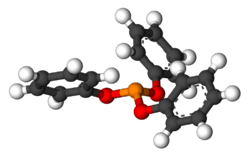Triphenyl phosphite
Triphenyl phosphite is the chemical compound with the formula P(OC6H5)3. This colourless viscous liquid is the ester of phosphorous acid and phenol. It is used as a ligand in organometallic chemistry. Nickel complexes of this ligand are homogeneous catalysts for the hydrocyanation of alkenes.
3.png) | |
 | |
| Names | |
|---|---|
| IUPAC name
Triphenyl phosphite | |
| Identifiers | |
3D model (JSmol) |
|
| ChemSpider | |
| ECHA InfoCard | 100.002.645 |
PubChem CID |
|
| UNII | |
CompTox Dashboard (EPA) |
|
| |
| |
| Properties | |
| C18H15O3P | |
| Molar mass | 310.28 g/mol |
| Appearance | colourless liquid |
| Density | 1.184 g/mL |
| Melting point | 22 to 24 °C (72 to 75 °F; 295 to 297 K) |
| Boiling point | 360 °C (680 °F; 633 K) |
| low | |
| Solubility | organic solvents |
| -183.7·10−6 cm3/mol | |
| Hazards | |
| Main hazards | flammable |
Except where otherwise noted, data are given for materials in their standard state (at 25 °C [77 °F], 100 kPa). | |
| Infobox references | |
Triphenylphosphite is prepared from phosphorus trichloride and phenol in the presence of a base:
- PCl3 + 3 HOC6H5 → P(OC6H5)3 + 3 HCl
Trimethylphosphine is prepared from triphenylphosphite:[1]
- 3 CH3MgBr + P(OC6H5)3 → P(CH3)3 + 3 MgBrOC6H5
Triphenylphosphite is a notable example of polyamorphism in organic compounds, namely it exists in two different amorphous forms at temperatures about 200 K.[2] Not long ago a new long-awaited polymorphic modification of triphenyl phosphite was obtained by means of crystallization in ionic liquids [3]
Representative coordination complexes
Triphenylphosphite forms zero-valent complexes of the type M[P(OC6H5)3]4 for M = Ni, Pd, Pt. The colourless nickel complex (melting point 147 °C) can be prepared from the nickel(0) complex of 1,5-cyclooctadiene:[4]
- Ni(COD)2 + 4 P(OC6H5)3 → Ni[P(OC6H5)3]4 + 2 COD
It also forms a variety of Fe(0) and Fe(II) complexes such as the dihydride H2Fe[P(OC6H5)3]4.[5]
References
- Leutkens, Jr., M. L.; Sattelberger, A. P.; Murray, H. H.; Basil, J. D.; Fackler, Jr., J. P. "Trimethylphosphine" Inorganic Syntheses, 1990, volume 28, pages 305-310. ISBN 0-471-52619-3
- Ha, Alice; Cohen, Itai; Zhao, Xiaolin; Lee, Michelle; Kivelson, Daniel (1996). "Supercooled Liquids and Polyamorphism†". The Journal of Physical Chemistry. 100: 1–4. doi:10.1021/jp9530820.
- D.G. Golovanov, K.A. Lyssenko, M.Yu. Antipin, Ya.S. Vygodskii, E.I. Lozinskaya, A.S. Shaplov. ”Long-awaited polymorphic modification of triphenyl phosphite“, Cryst. Eng. Comm., 2005, v. 7, no. 77, P.465 – 468. doi: 10.1039/b505052a
- Ittel, S. D. "Olefin, Acetylene, Phosphine, Isocyanide, and Diazene Complexes of Nickel(0)" Inorganic Syntheses, 1977, volume XVII, p. 117–124. ISBN 0-07-044327-0,
- Gerlach, D. H.; Peet, W. G.; Muetterties, E. L. (1972). "Stereochemically nonrigid six-coordinate molecules. II. Preparations and reactions of tetrakis(organophosphorus)metal dihydride complexes". Journal of the American Chemical Society. 94 (13): 4545. doi:10.1021/ja00768a022.